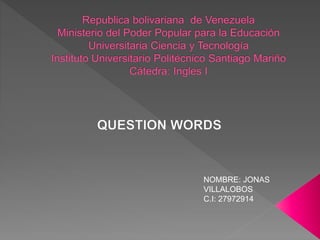
Question words
- 2. Las palabras de pregunta al igual que en español buscan obtener información acerca de un tema en específico. Hay varias palabras de pregunta en inglés y muchas son también sus formas derivadas pero por el momento nos centraremos en 7 en particular. Todas ellas son tan fáciles de usar como en español, la única confusión que puedes tener es en el caso de What y Which, que si te fijas tienen un significado en común. En el caso se Which se utiliza para preguntar cuando las opciones de respuesta se encuentran claramente definidas.
- 3. Se utiliza para preguntar por alguien y significa "quién" o "quienes". Who ate the cake? (¿Quién se comió la tarta?) Who did you see yesterday? (¿A quién viste ayer?) Who were those men you were with? (¿Quienes eran esos hombres con los que estabas?) WHO
- 4. se utiliza para expresar posesión en forma de pregunta y significa "de quién" o "de quienes". Whose jacket is this? (¿De quién es esta chaqueta?) Whose jackets are these? ¿De quienes son estas chaquetas?)
- 5. Se utiliza para preguntar por algo y significa "qué", "cual" o "cuales". What did you say? (¿Qué has dicho?) What is the capital of Argentina? (¿Cuál es la capital de Argentina?) Variantes: -What + nombre What colour are her eyes? (¿De qué color son sus ojos?) What time is it? (¿Qué hora es?) What day is it today? (¿Qué día es hoy?) Podemos añadir sort of, kind of or type of para preguntar por "qué tipo de", "qué clase de". What sort of music do you listen to? (¿Qué tipo de música escuchas?) What kind of clothes do you like? (¿Qué tipo de ropa te gusta?) What type of person are you? (¿Qué clase de persona eres?)
- 6. Suele confundirse con what ya que también significa "qué" o "cuál". La diferencia es que which se utiliza para preguntar por algo cuando hay varias opciones. There are four jackets. Which is yours? (Hay cuatro chaquetas. ¿Cuál es la tuya?) (cuál de las cuatro) We can take bus 10, 20 or 25. Which goes to the city centre? (Podemos coger el autobús número 10, 20 o 25. ¿Cuál (de ellos) va al centro?) Variantes: - Which + nombre Which bus did you take: 10, 20 or 25? (¿Qué autobús cogiste: el 10, el 20 o el 25?) Which teacher did you talk to: Amanda or Lewis? (¿Con qué profesor hablaste: con Amando o con Lewis?)
- 7. Compara: What is the tallest building in the world? (¿Cuál es el edificio más alto del mundo?) Which is taller: The Eiffel Tower or The Empire State? (¿Cuál es más alto: la torre Eiffel o el Empire State?) What colour are her eyes? (¿De qué color tiene los ojos?) Which colour do you prefer: red or black? (¿Qué color prefieres: rojo o negro?)
- 8. Se utiliza para preguntar por un lugar y significa "dónde" o "adónde". Where were you born? (¿Dónde naciste?) Where are you from? (¿De dónde eres?) Where is the museum? (¿Dónde está el museo?) WHERE
- 9. Significa"cuándo". When is your birthday? (¿Cuándo es tu cumpleaños?) When did she arrive? (¿Cuándo llegó?)
- 10. Se utiliza cuando queremos pregunte el porqué de algo. Significa "por qué". Why are you sad? (¿Por qué estás triste?) Why didn't you tell me? (¿Por qué no me lo dijiste?) A este tipo de preguntas se contesta con "because", que significa "porque". Why is she happy? (¿Por qué está feliz?) Because she passed her exam (porque aprobó el examen)
- 11. HOW > Se utiliza cuando queremos preguntar "cómo" o "cuán". How are you? (¿Cómo estás?) How was the party? (¿Cómo estuvo la fiesta?) How do you go to work? (¿Cómo vas a trabajar?) Variantes de how. La traducción de how variará en función del adjetivo o sustantivo que lleve detrás. How much > "¿Cuánto? (incontables) How much is this t-shirt? (¿Cuánto cuesta esta camiseta?) How much water do you drink? (¿Cuánta agua bebes?) How many > "¿Cuánto? (contables) How many friends do you have? (¿Cuántos amigos tienes?) How many books have you read? (¿Cuántos libros has leído?)
- 12. How often > "¿Cón qué frecuencia?" "¿cuántas veces?" "¿cada cuánto tiempo?". A esta pregunta se suele contestar con adverbios o expresiones de frecuencia. How often does she go to the cinema? (¿Cada cuánto tiempo va ella al cine?) She never goes to the cinema (ella nunca va al cine) How often do you go to the gym? (¿Con qué frecuencia vas al gimnasio?) I go to the gym twice a week (Voy al gimnasio dos veces por semana) How + adjetivo > Se utiliza para pregunta "cómo de", "cuán": how big (cómo de grande, cuán grande), how tall (cómo de alto, cuán alto), how far (cómo de lejos, cuán lejos).... Como decíamos antes, la traducción de how variará en función del adjetivo que lleve detrás e intentaremos que sea lo más natural posible en nuestra lengua materna. How big is your car? (¿Qué tamaño tiene tu coche?) How tall is he? (¿Cuánto mide?) How far is it from here to the airport? (¿Qué distancia hay de aquí al aeropuerto?) How old are you? (¿Cuántos años tienes?)
- 13. How + adjetivo > Se utiliza para pregunta "cómo de", "cuán": how big (cómo de grande, cuán grande), how tall (cómo de alto, cuán alto), how far (cómo de lejos, cuán lejos).... Como decíamos antes, la traducción de how variará en función del adjetivo que lleve detrás e intentaremos que sea lo más natural posible en nuestra lengua materna. How big is your car? (¿Qué tamaño tiene tu coche?) How tall is he? (¿Cuánto mide?) How far is it from here to the airport? (¿Qué distancia hay de aquí al aeropuerto?) How old are you? (¿Cuántos años tienes?)